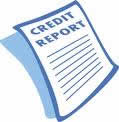Importance of Credit History
Have you ever wondered why you were turned down for an apartment or car loan? Or why you did not receive a job offer you applied for, even though you thought you had nailed the interview? Perhaps it was due to your credit record. Yes, you read correctly — credit record
What most people do not realize is that landlords, insurance companies, and employers — not just banks –check credit records. Your credit report allows these companies to look into your personal spending habits, your payment history, whether you have been sued, and whether you have declared bankruptcy.  Having a good credit history is an important part of maintaining a happy, healthy, and financially fit life.
Having a good credit history is an important part of maintaining a happy, healthy, and financially fit life.
A credit report is used as a future indicator of your credit worthiness, as it reveals pertinent information about your past and present payment patterns. A credit report shows whether you pay your bills on time and what existing loans you currently have.
If you have paid your bills on time in the past, this is a good indication to all that you will do the same in the future. If you have problems paying bills on time (you forget to write a check for the monthly electric bill, phone bill, and credit card bill), it indicates that more than likely, you will also have a problem paying the monthly rent or monthly car payment. Landlords do not want to lease an apartment to a tenant with a shaky credit history. Likewise, an employer may not want to hire someone who does not demonstrate financial responsibility and maturity.
what is a credit report and how do I get a copy?
Your credit report is essentially your credit history. The credit report details what credit cards you have open, what type of loans you have (school loans, mortgages, car loans), how long you have had the loans, and the amount of the outstanding balances (i.e. what is still unpaid).
The credit report lists not only credit card debt, but also lists debt from utility companies, phone companies, hospitals, banks, etc. The credit report then uses these facts to generate your credit score. A computer-based program then derives your credit score by using numerous factors in a complex formula. The computer takes into account factors such as how long it takes to pay your bills, how much debt you have, the number of inquiries into your credit history, liens, and bankruptcies. The computer spits out a three-digit number, typically between 500-800, which is entered on the report. The higher the number, the better the score.
Unfortunately, you cannot see your credit score. Your credit score is available to creditors and lenders only, and if you want your credit score , you’ve to pay the money to credit reporting company to see your credit score.
However, you can pull your credit report. You should pull your credit report at least once every year to check for errors. You can request your report from one of three major credit bureaus: Equifax ( 800-685- 1111 ), Experian (888-397-3742), and TransUnion (800-888-4213) once a year. Once you pull the report, look for inaccuracies such as accounts that do not belong to you, mistakes made by your creditors, companies that have requested your report without your permission. If you notice any errors, immediately report them to the credit bureaus.
Heare few important resources ..
Free Annual Credit Report Website
Facts for Credit Card Consumer
3-in-1 Credit Report
The Road to Good Credit
Now that you understand why credit is so important, let’s discuss how to establish good credit. In order to establish good credit, you need a good credit history. But to have a good credit history, you need to establish good credit. It is kind of like trying to find your first job — employers want experienced applicants but since this is your first job, you have to work first before you can have experience. Sound like Catch-22?

|
You may be right. But don’t worry, it is not as difficult as it seems. Here are some tips on how to establish good credit without a credit history:
- Open a bank account, whether it is a savings account, a checking account, or both. Be sure to handle the account responsibly and do not bounce checks.
- If you have services in your name, such as the electric, gas, and phone services, pay your bills in full and on time. And when you move, close the account. Do not let your roommate assume the bill from you because you are the only one responsible as long as the bill is in your name.
- Apply for a credit card. Use it sparingly and be sure to pay the card on time. If you cannot pay the full amount due, make at least the minimum payment. If you do not pay your credit card bills on time, you will be doing the exact opposite of what you are trying to achieve, which is establishing a good credit history.
How to improve your credit history ?
Now that you know what your credit report looks like, you can take some steps going forward to help improve your credit record.
- First, close accounts you are not using. Remember when you opened up that Pier One account a year ago to get a 10% discount and never used it again? Well, the card still appears active until you close it. So go ahead and close all those accounts that you do not use. Lenders view all accounts as liabilities that you can use at any time, even though you may have not used the card in three or four years. Lenders take the most conservative approach when evaluating the risk of lending you, the customer, and credit.
- Second, do not maximize all your credit limits. This is a red flag to lenders. If you use 80% or more of the credit you have available, it is a signal that you are stretched and living beyond your means. Another practice you might find helpful is to automate your bills online. It is easy to forget to send in a payment for the phone bill or electric bill. By allowing companies to automatically deduct funds electronically from your bank account, you will ensure the timeliness of all payments.
- Third, if you do have a credit card balance, pay more than the minimum each month. Credit card companies usually only require a minimum payment of 2% – 3%, which prolongs the painful and long process in paying down your debt. If you only pay the minimum amount required, you will wind up paying interest for years. Try to either double your payment or even pay down an extra $25 or $50 per month. These increased payments will save you hundreds, and perhaps thousands, in interest payments.
- Finally, it is important to steer clear of those companies who promise to clean up your credit record. Beware of debt doctors and credit repair agencies. The companies who offer to fix your report cannot remove negative information on your credit report. There are only two things that will help improve credit rating: time and reestablished credit. The fact is that blemishes on your credit report stay there for seven years. To improve your reports, remove misinformation from them, close accounts, and pay your bills on time.
| You may also like: | ||
 |
 |
 |
 |
 |
 |
See Also
 Email this page
Email this page


